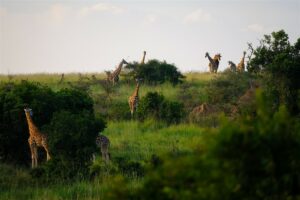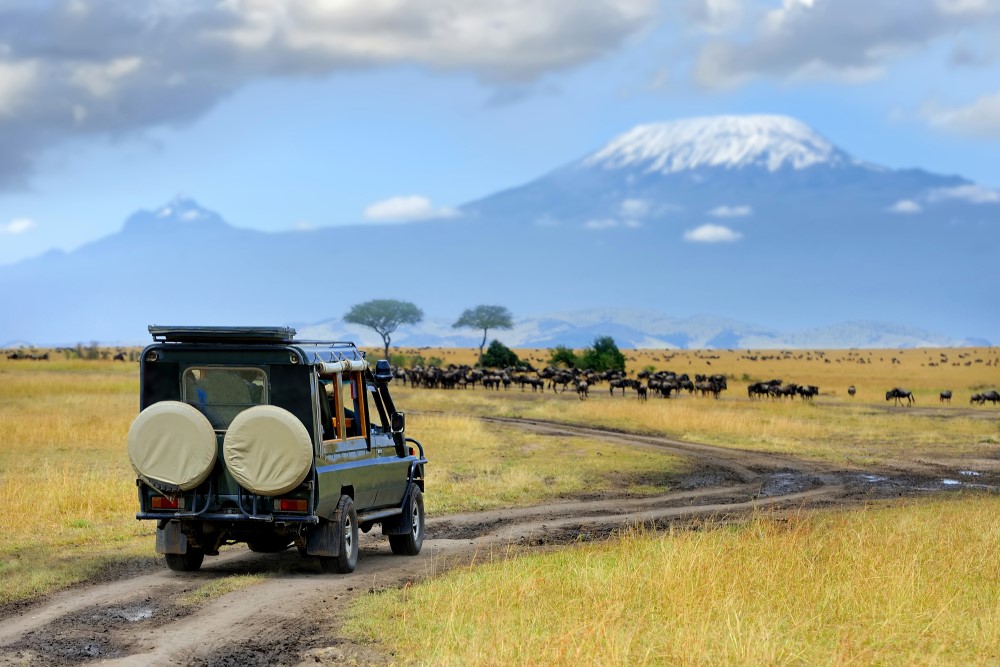 Going on an African safari trip is an unforgettable experience. Nothing beats seeing wildlife in their natural habitat and enjoying the variety of breathtaking landscapes that Africa has to offer – from the baobabs in Madagascar to the plains of the Serengeti. But before you plan your trip, there are a few things to consider.
Going on an African safari trip is an unforgettable experience. Nothing beats seeing wildlife in their natural habitat and enjoying the variety of breathtaking landscapes that Africa has to offer – from the baobabs in Madagascar to the plains of the Serengeti. But before you plan your trip, there are a few things to consider.
Our previous article about tips on when to go on a safari trip highlights some considerations to help you book the best time for an adventure, such as when the Great Migration in the Serengeti happens, as well as things like weather and heat. Brits love to take advantage of a sunny day, with 76% saying they would spend some time in the sun if not for work, according to a survey on sun awareness. But the heat is on a whole new level when you’re on safari, and could have negative effects on your skin, your eyes, and your overall health. If you’re a safari first-timer, here are some sun and heat safety tips to help you enjoy your trip:
Sun protection
Spending some time in the sun and heat is par for the course when it comes to safari adventures. Here’s how to protect yourself from the sun’s harmful rays while on your trip:
Wear sun-protective clothing
 A safari trip can put your skin at risk of overexposure to the sun’s ultraviolet (UV) rays which could cause sunburn, or worse, skin cancer. To avoid these problems, you should wear long-sleeved shirts that have a UV Protection Factor of 50 and above to ensure maximum coverage from the sun.
A safari trip can put your skin at risk of overexposure to the sun’s ultraviolet (UV) rays which could cause sunburn, or worse, skin cancer. To avoid these problems, you should wear long-sleeved shirts that have a UV Protection Factor of 50 and above to ensure maximum coverage from the sun.
Sun-protective clothing guarantees better sun protection because it is made of fabric that can absorb or block harmful UV rays. For a more enjoyable trip to the wild, you can try the Craghoppers NosiLife Tilpa Jacket and the Rovince Flexline Trousers.
Use sunglasses
 Your eyes are also at risk of developing problems such as photokeratitis – or sunburn to the eyes – and cataracts when overexposed to UV rays and the sun’s harmful light. This risk is increased when you’re outdoors, so be sure to bring sunglasses that offer protection from the sun when on safari. Purchasing a pair online allows you to choose among a diverse range of brands with UV protection, and you can even have your lenses polarised to reduce glare and prevent eye strain during a trip. Oakley’s OO9154 Half Jacket and the Ray-Ban RB3516 are some sunglasses that are perfect for sun protection and the rigours of safari life. These sunglasses come from reputable brands with patented lens technologies, so you’re assured that they can protect your eyes from UV damage while staying resistant to scratches caused by dust and sand.
Your eyes are also at risk of developing problems such as photokeratitis – or sunburn to the eyes – and cataracts when overexposed to UV rays and the sun’s harmful light. This risk is increased when you’re outdoors, so be sure to bring sunglasses that offer protection from the sun when on safari. Purchasing a pair online allows you to choose among a diverse range of brands with UV protection, and you can even have your lenses polarised to reduce glare and prevent eye strain during a trip. Oakley’s OO9154 Half Jacket and the Ray-Ban RB3516 are some sunglasses that are perfect for sun protection and the rigours of safari life. These sunglasses come from reputable brands with patented lens technologies, so you’re assured that they can protect your eyes from UV damage while staying resistant to scratches caused by dust and sand.
Heat protection
African safaris experience generally warm and sunny weather throughout the year, which means you may need to expect intense levels of heat. Protect yourself through these tips:
Wear a wide-brimmed hat
 Hats can offer heat protection, especially in the absence of shade when you’re out in a vast open space on the safari. Heat can be extremely uncomfortable and could affect your overall experience during the trip.
Hats can offer heat protection, especially in the absence of shade when you’re out in a vast open space on the safari. Heat can be extremely uncomfortable and could affect your overall experience during the trip.
Bring a wide-brimmed hat to make you feel slightly cooler, as it can block sunlight from penetrating your head and face.
The Barbour Dawson Safari Hat is a great companion that can provide relief from the heat and is easy to pack and bring around.
Bring a reusable water bottle
 Due to the heat, you may sweat profusely during the trip. It’s essential to replace these lost fluids to avoid dehydration and, in worst-case scenarios, heat stroke. To be safe, you and your companions should pack stainless steel reusable water bottles so you can hydrate from time to time and allow your body to cool off. These bottles are easy to bring and allow you to reduce the use of plastics and promote the safari’s environmental conservation efforts. The Hydro Flask Wide Mouth is a great option because it keeps your water cool for an extended period and holds up to bumps, scrapes, and falls outdoors.
Due to the heat, you may sweat profusely during the trip. It’s essential to replace these lost fluids to avoid dehydration and, in worst-case scenarios, heat stroke. To be safe, you and your companions should pack stainless steel reusable water bottles so you can hydrate from time to time and allow your body to cool off. These bottles are easy to bring and allow you to reduce the use of plastics and promote the safari’s environmental conservation efforts. The Hydro Flask Wide Mouth is a great option because it keeps your water cool for an extended period and holds up to bumps, scrapes, and falls outdoors.
A safari adventure is filled with memorable experiences, especially for first-timers. Just be sure you’re well protected from the sun so you can enjoy your trip. For more travel tips, visit Real Africa for the latest updates.


